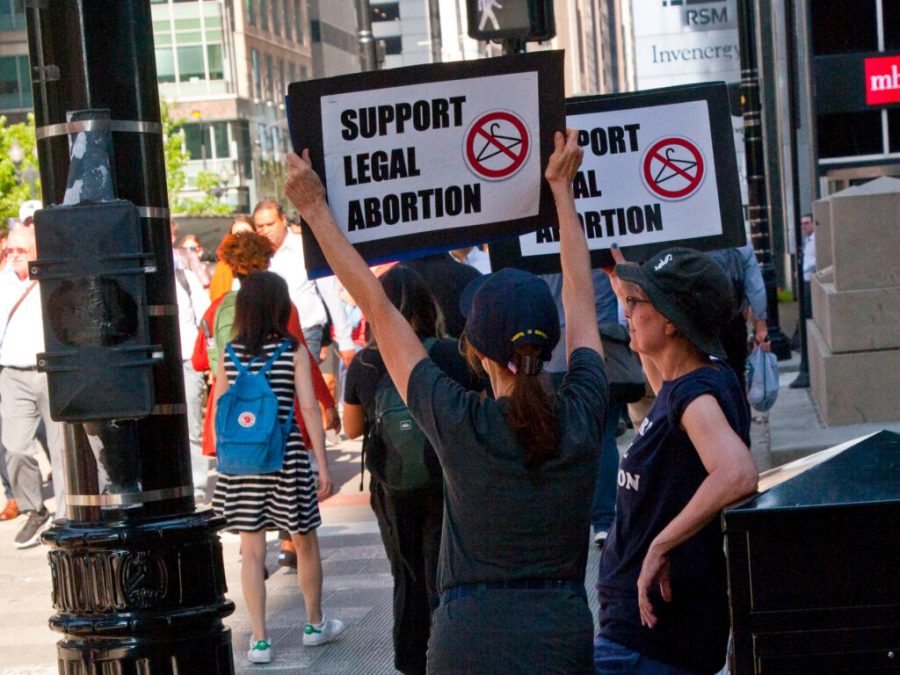Controversial Texas Law Results in Near-Total Abortion Ban
Photo: Creative Commons: kunm.org
September 24, 2021
On September 1st, one of the most extreme abortion laws in the country went into effect. Texas Governor Greg Abbott signed into law Senate Bill 8, which bans doctors from carrying out abortions once a cardiac activity is detected in an embryo. So, what does this mean for our country?
The law is highly controversial, as it does not make exceptions for rape, sexual abuse, or incest. The law bans abortions as early as six weeks after conception, which is before many people even find out they are pregnant. What’s novel about the Texas abortion law is that the prohibition isn’t enforced by state authorities but by concerned citizens who can file lawsuits. It allows people to sue individuals who may have assisted a patient in carrying out an abortion that violates the ban, individuals who drive patients to abortion clinics, and individuals who help pay for abortions. The law has received much backlash on social media. Qasim Rashid, best-selling author and practicing attorney, wrote on Twitter: “Texas banned mask mandates claiming they believe in personal autonomy without big government—and then passed an abortion ban that would force a rape victim to carry to term & give those who snitch $10k. It was never about personal autonomy. It was always about controlling women.”
The law skirts the right established under Roe v. Wade, a landmark decision by the Supreme Court in 1973 to legalize abortions. Since then, no state had successfully banned abortions, until now. States are unable to ban abortions outright before fetal viability, which is approximately at twenty-four weeks of pregnancy. Texas is the first state to effectively prohibit nearly all abortions.
The Justice Department sued Texas over S.B. 8 and conducted an emergency motion on September 14th. The department claims the ban is unconstitutional “under the longstanding Supreme Court precedent.” The ban infringes upon the activities of federal programs, which are obligated to provide abortion-related services. According to the Justice Department, the state also cannot violate constitutional rights such as the right to an abortion.
Proponents of the bill have been explicit about their desire to reduce, if not eliminate, abortion in Texas. Texas Right to Life launched a new ‘whistleblower’ website to enforce the laws, urging people to submit evidence and anonymously turn in violators of the law. However, TikTok activists, Twitter users, and programmers took matters into their own hands by overflowing the site with bogus reports. “Gov. Greg Abbott of Texas, who was a leading proponent of the abortion law, was a violator, according to some of the tips,” wrote The New York Times. Other tips also included Marvel’s Avengers characters and even a copied script of the “Bee Movie.” In actions referred to as “hacktivism,” developers also set up apps to automatically spam the website with fake tips. Their efforts have been working: the whistleblower site is now taken down.
Furthermore, companies such as Lyft and Uber have been making efforts to resist the new law. “Drivers are never responsible for monitoring where their riders go or why,” Lyft wrote in an email to their employees. “Imagine being a driver and not knowing if you are breaking the law by giving someone a ride… Imagine being a pregnant woman trying to get to a healthcare appointment and not knowing if your driver will cancel on you for fear of breaking a law. Both are completely unacceptable.” According to Logan Green, CEO at Lyft, the company “has created a Driver Legal Defense Fund to cover 100% of legal fees for drivers sued under S.B. 8.” Additionally, he states, “Texas S.B. 8 is an attack on women’s right to choose. Lyft is donating $1 million to Planned Parenthood to help ensure that transportation is never a barrier to healthcare access.” Uber responded shortly after, announcing that it will also cover all legal fees for any drivers sued under the law.
On September 20th, two attorneys filed separate lawsuits against Dr. Alan Braid, who revealed to the public that he had performed an abortion. He published an opinion piece in The Washington Post titled, “Opinion: Why I Violated Texas’s Extreme Abortion Ban.”
The lawsuits are interpreted to be among the first actions taken under the new abortion law—by an Arkansas attorney and an Illinois plaintiff. “I’m not pro-life,” Oscar Stilley, from Arkansas, said in an interview with The New York Times. “The thing that I’m trying to vindicate here is the law. We pride ourselves on being a nation of laws. What’s the law?” Many assume the opinion piece was published to test the constitutionality and limits of the law. The Texas Right to Life describes the case as a “self-serving legal [stunt], [with the litigants] abusing the cause of action created in the Texas Heartbeat Act for their own purposes.”
Texas is not alone in struggling to compromise on abortion rights—Mexico and Mississippi are also grappling with the same issue. In the near future, S.B. 8 could set the stage for eventually overturning Roe v. Wade. According to the Guttmacher Institute, “For nearly 50 years, the Court has held that abortion rights are protected under the U.S. Constitution, yet by taking this case, the Court is signaling that these rights are in serious jeopardy. This is the first time the Court has agreed to review a previability gestational age ban since Roe.” On September 1st, the Supreme Court refused to block S.B. 8 from going into effect—an unpromising sign for the future of abortion rights.

















































































































































